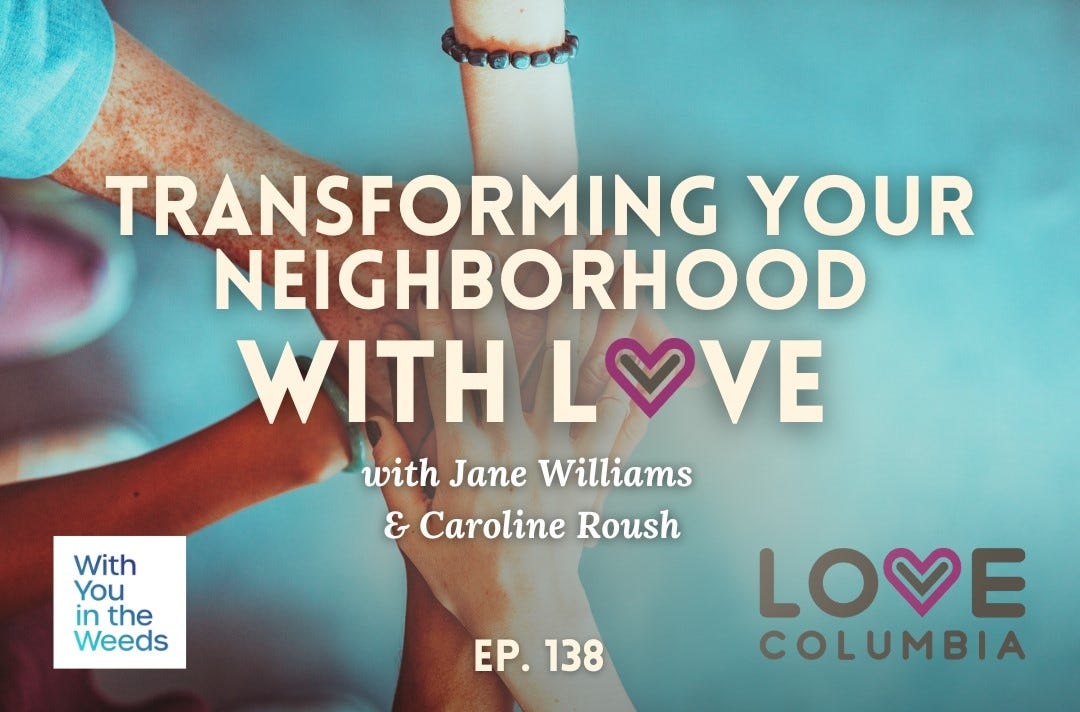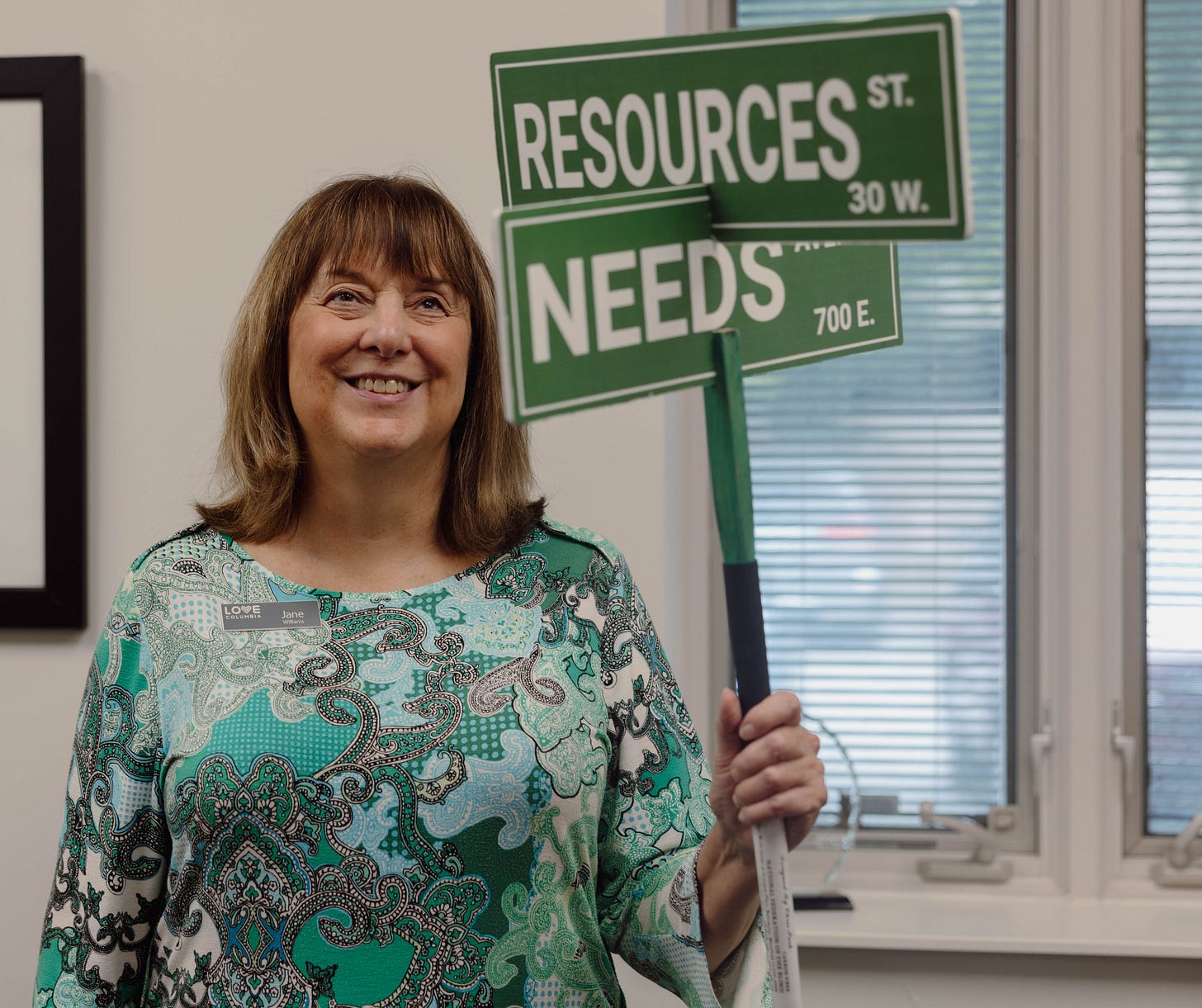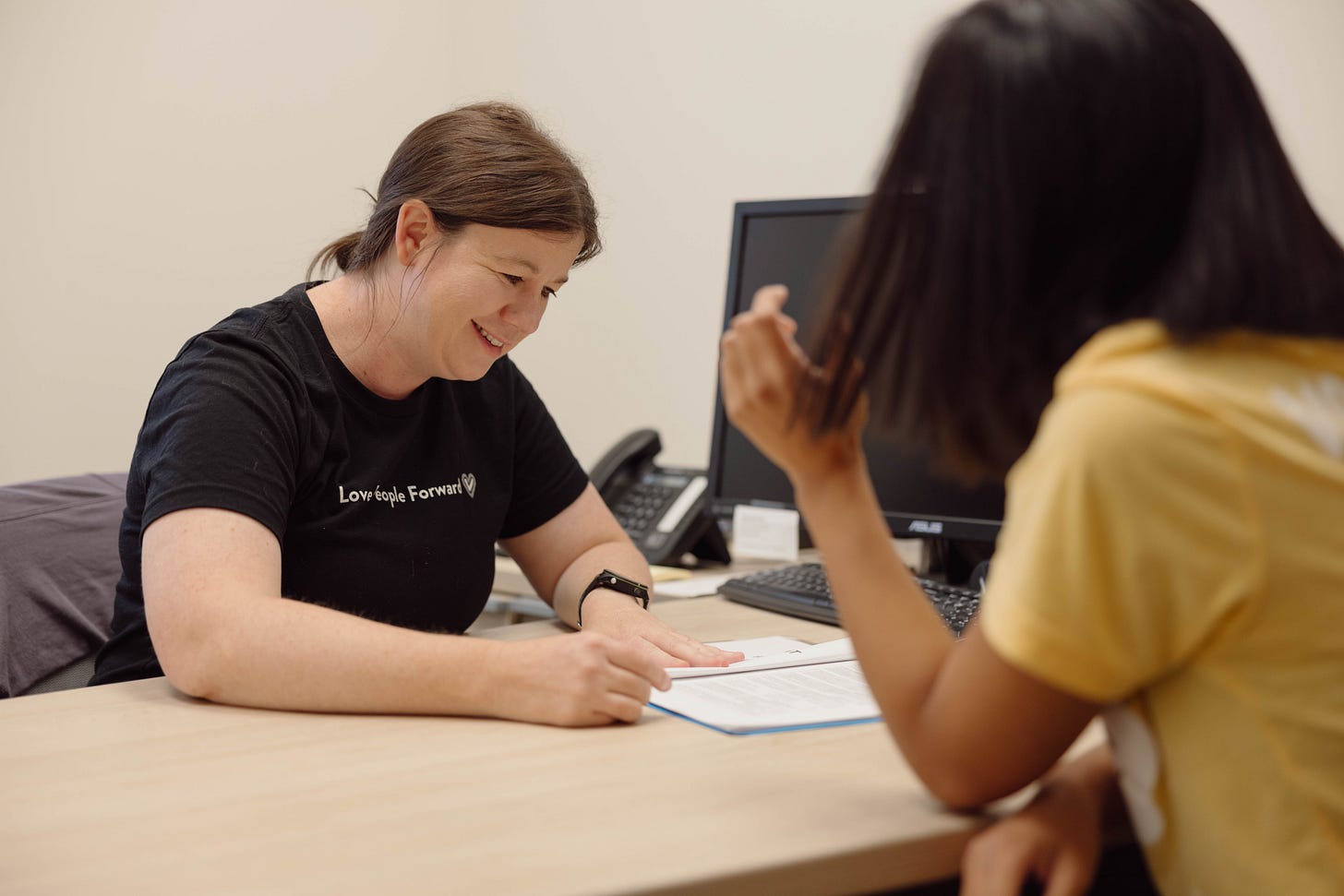Transforming Your Neighborhood with Love
Simple acts of kindness bring hope
Did you know that transforming an entire city could start with one small act of faith? And that sometimes, what seems like your biggest limitation can be your greatest strength?
In this next episode of our ongoing series, Loving Your Neighbor as Yourself, Lynn sits down with Jane Williams and Caroline Roush of Love Columbia to hear about how the ministry grew from a simple gesture of offering to pray for neighbors to a vibrant hub that offers a wide range of services to the community.
Love Columbia serves anyone in Columbia who is struggling with basic needs like transportation, debt, housing, employment, and addiction recovery. Many times, people have no support network, and are under great stress while facing multiple challenges. Without intervention, their situations would result in a negative domino effect, like eviction leading to homelessness or unaffordable car repair leading to job loss.
Both women have internalized valuable lessons from their work at Love Columbia. Jane, the co-founder and Executive Director, had a profound physical loss that deepened her reliance on God and re-energized her mission to build a ministry that meets both physical and emotional needs for the most vulnerable.
Through her role as Director of Communication, Caroline has learned that you need to understand each individual’s needs, struggles, and dreams before offering them practical help - and that even small wins are cause for celebration.
In this episode you will learn how God can use these key elements to accomplish great things:
The willingness to humbly acknowledge your need for help
Faith in God’s provision even in hard times
Endurance to persevere through challenges
The importance of social connectedness in transforming lives
You’ll be encouraged to hear how God can use our greatest limitations and wounds to bear fruit, grow empathy, and draw others closer to Him.
Highlights of Lynn’s Conversation with Jane and Caroline
Lynn: This morning I have two special guests with me. One of them I know very well, the other one is someone I admire from a distance. The first guest is my daughter-in-law, Caroline Roush, who has made our son Jack so happy and according to our daughter Emma, is the sister she never had but always wanted.
My other special guest is Jane Williams, who has an incredible personal testimony as well as an inspiring story of co-founding Love Columbia in Columbia, Missouri. Her organization has become the place where people who are struggling can find hope and enter into a process of personal transformation. Welcome to With You in the Weeds, Jane and Caroline!
Jane, before we talk about Love Columbia, can you tell us briefly about your life and how you have thrived in spite of challenging limitations?
Jane: I'm best known for having lost my eyesight at the end of 2012. Our ministry was a five-year-old nonprofit startup when a failed eye surgery left me completely blind.
Despite the devastating loss, I continued leading the organization with the help of supportive volunteers—five women each read emails to me on different days of the week. This trial deepened my dependence on God. I felt called to continue, even though it seemed like running off a cliff—until God reassured me that I was "speeding up to fly."
Losing my sight forced me to delegate more and involve others, aligning with the original vision of community-wide engagement to help neighbors in need. Spiritually, it became a time of deep intimacy with God, and I experienced his nearness, provision, and power in new ways, especially through prayer and Scripture verses like “Apart from me, you can do nothing.”
My brokenness became a testimony and a strength, helping me relate more authentically to those that needed help. One person even said they wanted help from me specifically because it “looked like she’d been through some stuff.” Jesus showed his wounds to us so that we could draw near to him and I’ve been able to do the same.
Lynn: Your experience definitely gives you more compassion and empathy! That’s a great starting place, but I’d like to hear more about how Love Columbia came about.
Jane: In 1996, one of my neighbors and I decided to start going door-to-door in public housing. She was a journalist and loved graphic design, and made cute t-shirts that said, “Free Prayer”. We had refrigerator magnets and small New Testaments. As we went door-to-door, we asked people if they wanted us to pray with them.
For almost two years, we didn’t really do anything but just listen. I wanted to find out what people’s deepest heart cries were, but I knew that relational brokenness was the most significant issue that people were facing. Even when dealing with financial challenges, unstable housing, and job loss, people in crisis find ‘relational poverty’ the most difficult challenge.
After a while, I realized that we needed some structure to take the awkward moments out of the ministry. I found an organization called Love, Inc. that had a good model we could use to start our ministry. The way it has grown in just incredible.
Lynn: Caroline, you’ve been working as Director of Communications for Love Columbia a little over two years now. What kinds of personal transformations have you seen?
Caroline: What makes Love Columbia unique is that before we’re doing anything to help someone, our staff is getting to know the client. We don’t take a cookie-cutter approach to solving issues of housing, finances, relationships, and other issues. We want to understand someone’s individual struggles and pain. So before we do anything else, we listen. That leads to the most beautiful transformative process.
Some days we get to see someone who walks in and they're just celebrating, and you can't be more excited to see that now they have a stable job and are on the path to home ownership. But other times they’re coming in on their worst day ever, and we need to be there for them.
Lynn: How do you guys manage it when someone comes in with a long list of overwhelming problems?
Jane: We have a little catchphrase, “Serve the whole person and engage the whole community.” We use intake and assessment questions when they first come in. We train our staff and volunteers to ask the right questions. That gives us a place to start.
Lynn: What role do mental health issues play?
Jane: Statistically, if we look at those intake assessments that we do, about 40% of the people that come to us tell us they have a health or mental health concern. A couple of years ago, we did a survey with 25 people who were unemployed but were reluctant to seek career coaching. We discovered that 88% of them said they were struggling with anxiety and depression. So there’s a high correlation between mental health and unemployment.
Lynn: What are some ways to help people get out of poverty?
Jane: Raj Chetty, a Harvard economist, has intersected IRS and census data to see what it takes to escape poverty if you are born into it. What he’s found is that the biggest factor in helping someone with upward mobility is increasing their social connectedness. That's particularly helpful even across class.
Social connectedness means that someone can give you a key piece of information, provide you with a job opportunity, or share knowledge about a school or a scholarship. When you think about yourself and your family, you realize how many of your social connections helped guide things like college and career. Those may be invisible threads, but we wouldn’t be where we are without them.
Lynn: Caroline, tell me what it’s like to see people come through the door who need help. What’s the first step?
Caroline: We help people with the physical, financial, and mental health issues that they have. Initially that means they come in and unload their burdens on the staff. But after months have gone by, and they’ve completed financial coaching, they’re budgeting, they have reliable transportation, maybe even buy a house, then they are so excited to come back to our office and ring the Joy Bell.
Kelly Van Doren, who is one of our fantastic, energetic, wonderful staff members, brought in her mom's old school bell, a big loud bell, and said, we really need to be celebrating with these people, no matter what they're celebrating: a new job, paying off debt, staying in school, buying a house, or your child got straight A's this semester. People run in the door beaming and can’t wait to ring the bell and share with our staff what they’ve accomplished.
Lynn: As exciting as it is to see the wins, it has to be hard to hear about all the heartache, sadness, and suffering. How do you guys stay refreshed and motivated to keep going and doing this work?
Jane: We have a classic line we say a lot when someone says, “How do you keep hearing all these sad stories?” We say, “Wouldn’t it be sadder if they didn’t have anyone to tell the stories to?” We try to find a way to help everyone to lighten their load in some way and give a manageable step forward. Manageable steps are huge for every person, whether it's a volunteer or staff. Our staff support each other on hard days.
When asked, “How do you keep hearing all these sad stories?”
We reply, “Wouldn’t it be sadder if they didn’t have anyone to tell the stories to?”
Lynn: How do you stay motivated, Caroline?
Caroline: The pastors here at The Crossing use the starfish analogy as such a beautiful picture of helping. There’s a big storm on the beach, all these starfish are washed up, and there's a little girl picking them up and throwing them back one by one. Someone stops her and says, “Don’t you know how long this beach is? You’re never going to get all of them.” And she replies, “If I can make a difference for one, it’s worth it.”
Lynn: I feel so blessed and encouraged to hear about the work that you are doing, living out Jesus’ mandate to “Love your neighbor as yourself.” Thank you both for being here today!
Recommended Resources:
Love Columbia - Learn how you can serve, donate, and support the ministry






